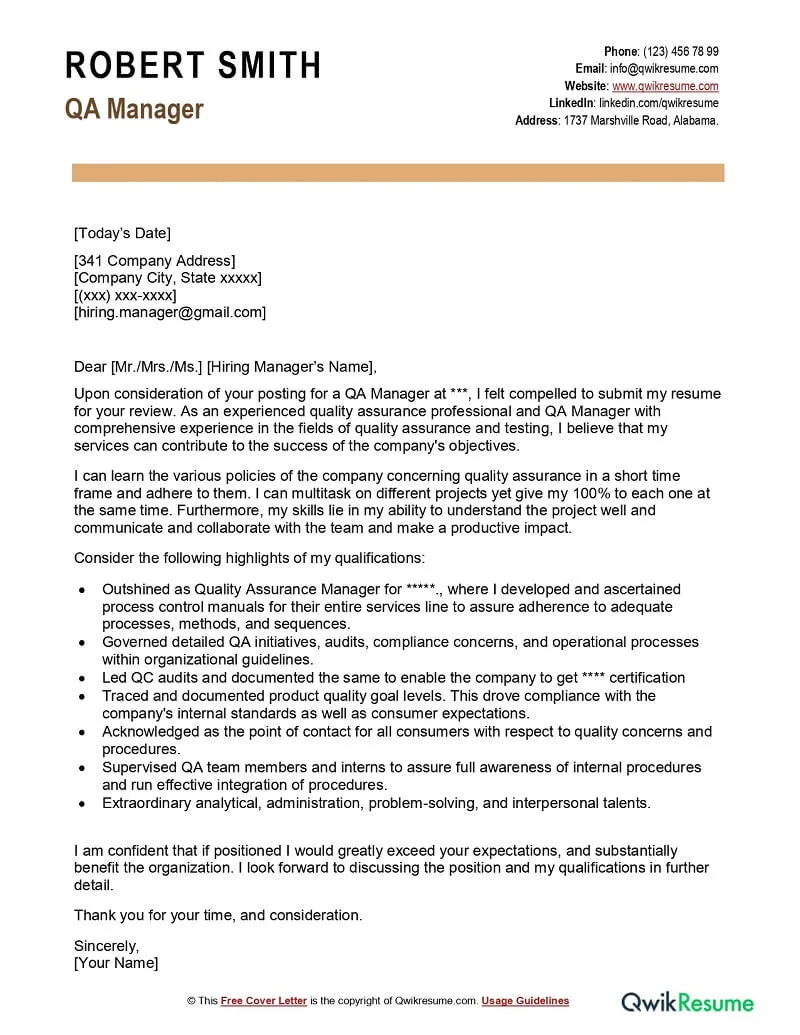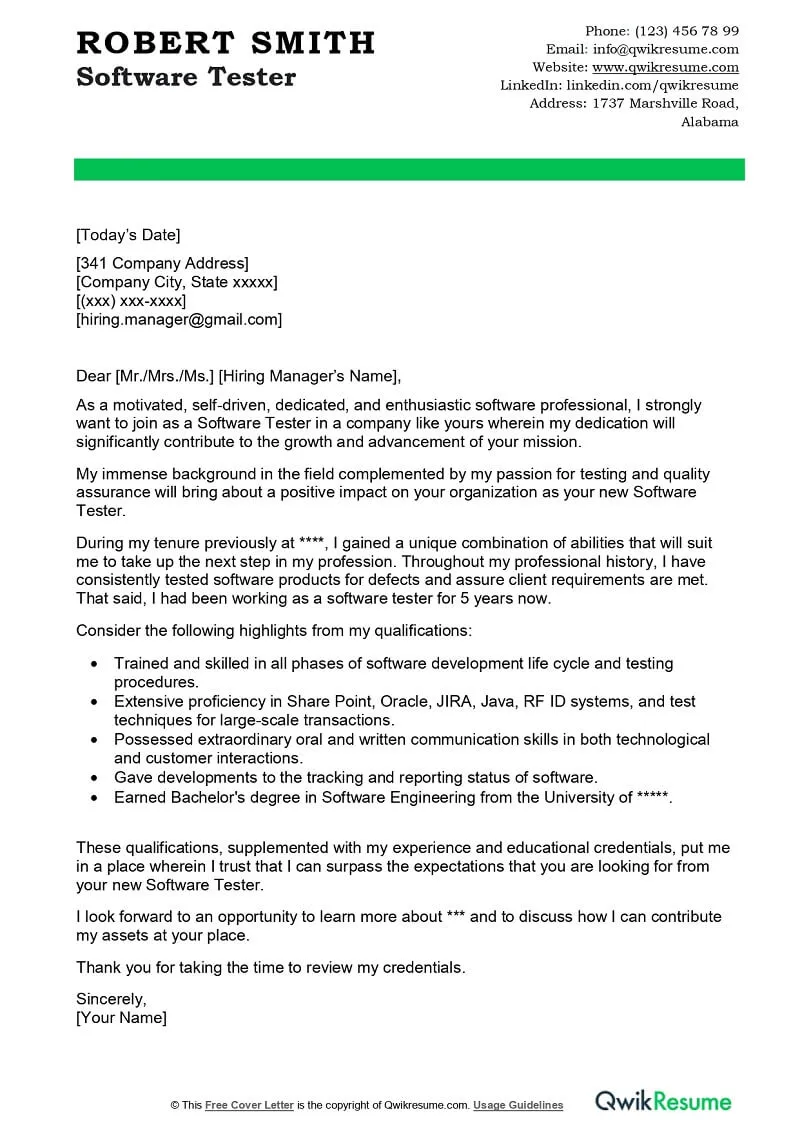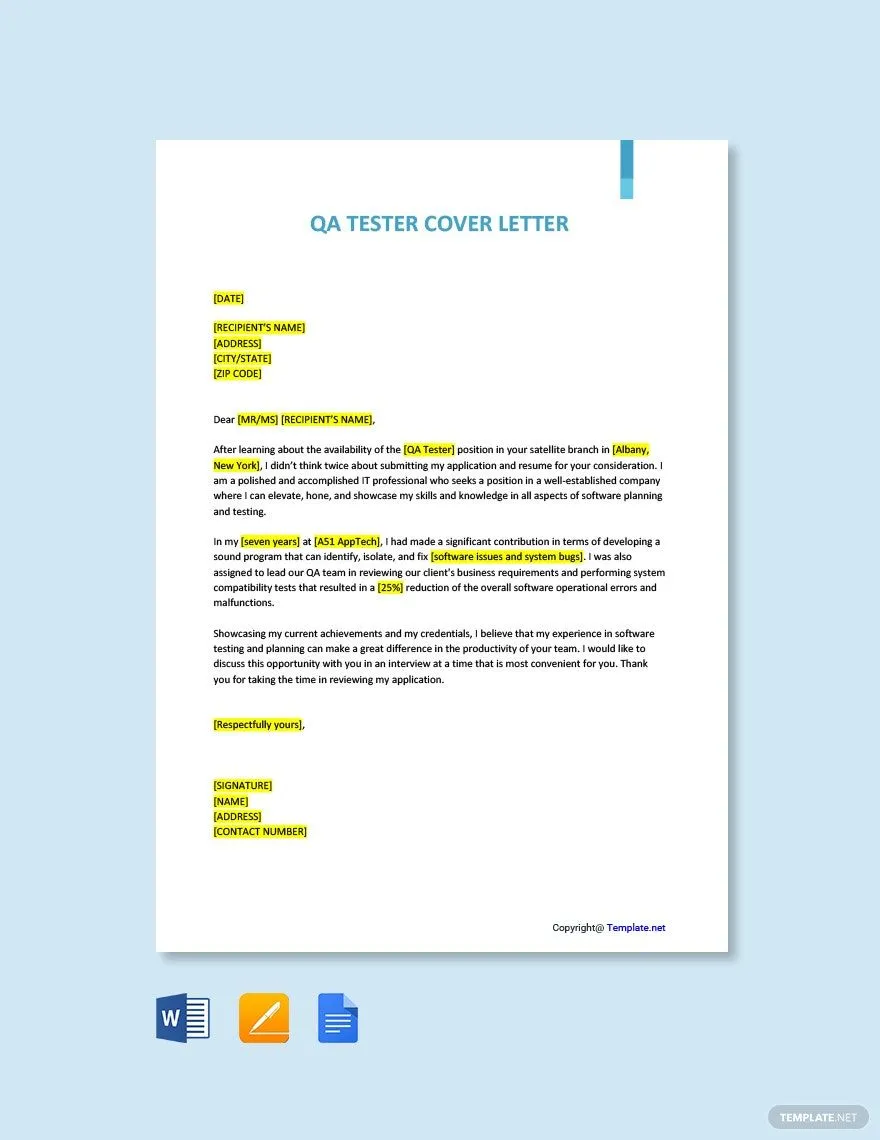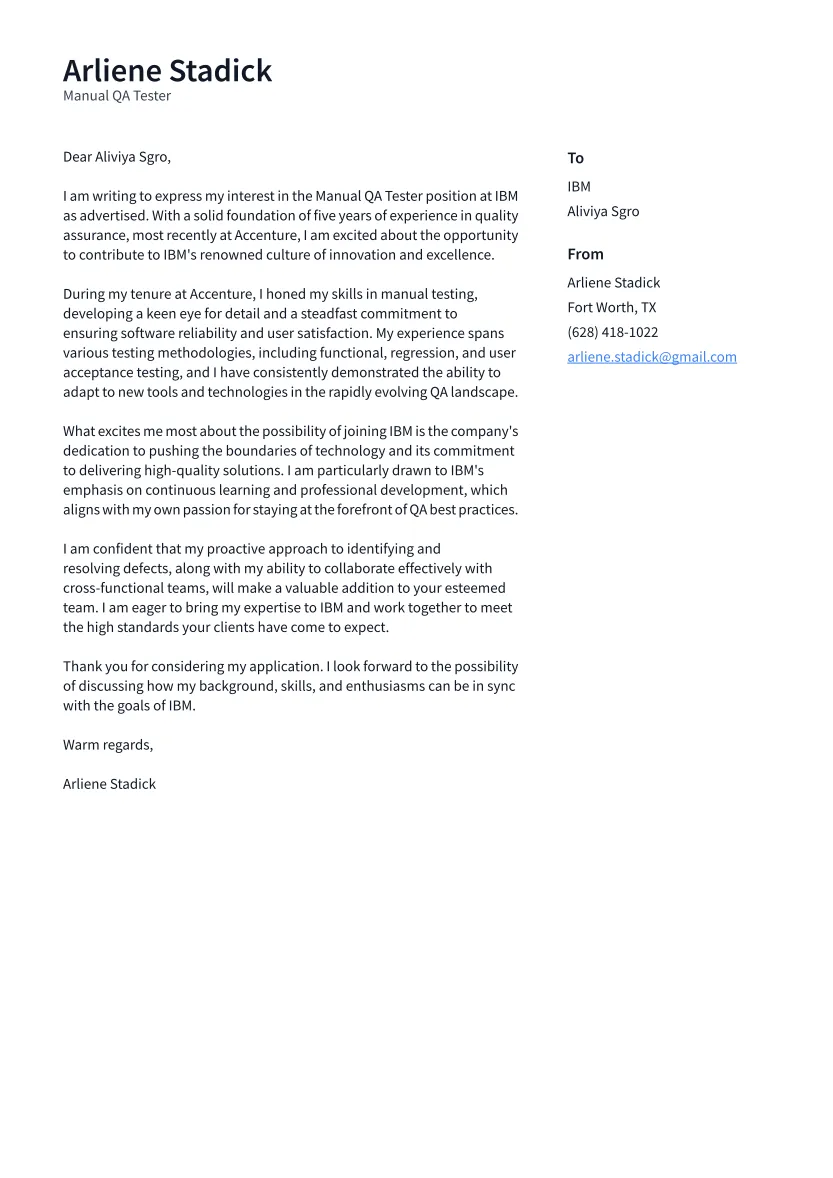QA Tester Cover Letter Top 5 Tips
Crafting a compelling cover letter is crucial when applying for a QA Tester position. It’s your first opportunity to make a positive impression and convince a hiring manager that you are the ideal candidate. A well-written cover letter should not only highlight your skills and experience but also demonstrate your enthusiasm for the role and the company. It should be tailored to the specific job, showcasing why you are the best fit. This guide provides you with the top five tips to create a cover letter that will help you stand out from the competition and land your dream job as a QA Tester. The focus is on making your cover letter informative, personalized, and engaging, ultimately leading to an interview invitation. Remember, your cover letter is a marketing tool; use it to sell yourself effectively.
Highlight Your Skills
Your cover letter should prominently feature your relevant skills. QA testing requires a diverse skill set, encompassing both technical and soft skills. When detailing your abilities, be specific and provide examples of how you’ve utilized them in previous roles. This section is where you paint a clear picture of your capabilities. Instead of merely listing skills, showcase your proficiency through concrete examples that highlight your accomplishments. Emphasizing your abilities not only grabs the reader’s attention but also establishes you as a competent and suitable candidate. By carefully selecting and elaborating on your skills, you can significantly increase your chances of a positive response.
Technical Skills

Technical skills form the backbone of a successful QA Tester. Your cover letter should highlight your expertise in areas such as test case design, test execution, and bug reporting. Mention any specific testing tools or technologies you are proficient in, such as Selenium, JUnit, or Postman. If you have experience with different testing methodologies like Agile or Waterfall, make sure to include that as well. For instance, you might describe how you utilized Selenium to automate regression tests, saving the team significant time and effort. Similarly, detailing your ability to effectively use bug-tracking systems like Jira or Bugzilla showcases your attention to detail and efficiency. Remember to tailor the technical skills section to match the requirements outlined in the job description, emphasizing the most relevant and in-demand proficiencies.
Communication Skills
Effective communication is vital for QA Testers. Your cover letter should showcase your ability to clearly articulate issues, collaborate with developers, and create comprehensive test documentation. Illustrate how you have used communication skills in past roles. For example, you might mention how you wrote clear and concise bug reports that helped developers understand and fix issues quickly, or how you facilitated effective communication between cross-functional teams during the testing process. Also, describe how you have presented findings to both technical and non-technical stakeholders. Highlight how you have successfully negotiated with teams and created clear and concise documentations. Good communication ensures everyone is on the same page and problems are addressed in a timely manner.
Problem-Solving Skills
QA Testers constantly encounter problems and must devise effective solutions. Your cover letter should highlight your problem-solving abilities. Provide examples of how you have identified, analyzed, and resolved complex testing issues. Describe your approach to troubleshooting and how you have used critical thinking to find the root causes of bugs. For example, you could explain how you used a structured approach to debug a particularly difficult issue, outlining your steps to identify the problem, replicate the issue, and work with developers to implement a fix. Emphasize your ability to think critically, work independently, and come up with innovative solutions. This demonstrates that you’re resourceful and can handle challenges. These attributes will make you a valuable asset.
Showcase Relevant Experience

Your cover letter should provide detailed information about your relevant experience. Instead of simply listing your previous roles, provide a narrative that highlights your accomplishments and responsibilities. Describe the types of projects you’ve worked on, the testing environments you’re familiar with, and the tools you’ve used. Focus on illustrating your expertise and the value you bring to the table. For instance, if you have experience with a specific software, product, or industry, make sure to mention that. Include details about the size and scope of projects you’ve been involved in, and the team dynamics you’ve worked within. Always quantify your results and provide specific examples to demonstrate the impact you’ve made in previous roles. This paints a clear picture for the hiring manager.
Quantify Your Achievements
Quantifying your achievements is essential to make your cover letter impactful. Instead of just stating that you improved the quality of a product, provide measurable results. For example, you might say, “Reduced the number of critical bugs by 30% through rigorous testing and improved test coverage.” or “Implemented automated tests, resulting in a 20% reduction in testing time.” Use data to showcase the value you brought to your previous roles. By quantifying your achievements, you give hiring managers concrete evidence of your capabilities. This not only demonstrates your effectiveness but also highlights your ability to achieve tangible results. Whenever possible, use numbers and percentages to demonstrate the impact you’ve made, making your cover letter more compelling and memorable.
Tailor to the Job Description
Customizing your cover letter for each job application significantly improves your chances of success. Carefully read the job description and identify the key requirements and desired skills. Then, tailor your cover letter to directly address these requirements. Highlight the skills and experiences that align with the specific needs of the role and the company. For example, if the job description emphasizes experience with a particular testing tool, make sure to prominently showcase your proficiency in that tool. If the company values teamwork, include examples of your collaborative efforts in previous roles. Tailoring your cover letter demonstrates that you have carefully considered the job and are genuinely interested in the position. It also shows you’ve taken the time to understand the company’s needs, which makes you a more attractive candidate.
Emphasize Your Passion

Showcasing your passion for QA testing is a key component of a successful cover letter. Your enthusiasm for the field should be evident throughout the letter. Express your genuine interest in the role and the company. You can mention why you are drawn to QA testing, what motivates you, and what you find exciting about the field. For instance, you might discuss your interest in ensuring software quality or your excitement about working on a particular type of product. If you’re applying to a company whose products or services you admire, mention that in your cover letter. This shows the hiring manager that you care about more than just the job – you are also interested in the company. A demonstrated passion will help set you apart.
Proofread Meticulously
Proofreading is essential to ensure your cover letter is polished and professional. Errors in grammar, spelling, or punctuation can create a negative impression and undermine your credibility. Before submitting your cover letter, carefully review it multiple times. Consider reading it out loud to catch any awkward phrasing or mistakes. Ask a friend or colleague to proofread it for you; a fresh pair of eyes can often spot errors that you might miss. Ensure your cover letter is free of typos, grammatical errors, and formatting inconsistencies. Remember, your cover letter is a reflection of your attention to detail and your commitment to quality. A well-proofread cover letter shows that you take pride in your work and that you pay attention to the fine details, which are essential qualities for a QA Tester.
Final Thoughts
Writing a strong cover letter is an essential step in the job application process for QA Testers. By following these top five tips, you can create a cover letter that highlights your skills, experience, and passion. Remember to customize your cover letter for each job, quantify your achievements, and always proofread before submitting. By doing so, you will increase your chances of getting noticed by hiring managers and securing an interview. Good luck with your job search, and may your cover letter be a key factor in landing your dream job. A well-crafted cover letter is more than just a formality; it is a powerful tool that can showcase your potential and make you a standout candidate. Focus on making a positive first impression, and you are well on your way to success. Your attention to detail and your effort will pay off.
